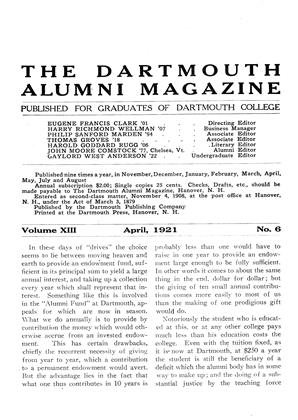The Proceedings of the American Academyof Arts and Sciences, volume 56, number 2, contains "Ghosts and Oculars" by Louis Bell '84.
Frederick James Allen '89 is the author of "A guide to the Study of Occupations; a selected critical bibliography of the common occupations with specific references for their study" published by the Harvard University Press.
During the past year Fred O. Copeland '08 has published the following articles: "Around Ticonderoga's Walls" in the May, 1920, issue of Travel, "From Custer's Hill" in the May issue of Field and Stream, "The Alder Pasture Mystery" in Field and Stream for February, "The Bank Revolver" in Burrough's ClearingHouse for February, "Sitting Bull's Last Trail in the issue of Youth's Companion for July IS, 1920, "The Last Great Indian Village" in the Western Story Magazine for September, 1920. "With Clout Stick and Pill" in the Banker'sMonthly for December, 1920, "So! Here is Winter" in Burrough's Clearing House for January, 1921, "Looking the Six-Gun in the Eye" in Rod and Gun in Canada for February, 1921, "Draw, Stranger" in Field and Stream for February, 1921.
THE PHANTOM CARAVAN, by Kendall Banning '02, Chicago. The Bookfellows, 1920.
Mr. Banning's book is a collection of some forty poems, none of them long, dealing principally with love and the "wander-lure." Mr. Banning is at all times a good workman and often a poet of genuine' strength and inspiration. It is the love poems, however, and one other, the title piece, that show Mr. Banning at his best. The wander-lure poems, for all their fine splashing rhythm and occasional lines of startling beauty and strength are dominated by the Kipling-Masefield tradition. When Mr. Banning sings' of
"The mainsail haul to a biting breeze And a star to steer me by" the mind instinctively goes back to Masefield's "And all that I ask is a tall ship And a star to steer her by."
And Mr. Banning's use of the "Seven Seas" and "Romance Is Dead" and other Kiplingesque phrases shows unmistakably where he learned his trade.
In his love songs, however, Mr. Banning achieves not only delicacy of imagery and movement singability, external and internal, in a word; but individuality as well. Here his touch is surer. His lyrics, to be sure, do not always possess the inevitability of Sara Teasdale's, but they have grace and rapture and genuine fineness of spirit. "The Grail," "Once on a Radiant Morning," "Beyond," "Ah, Pierrot," "Impregnable;" are all memorable bits of song. And the more ambitious "The Winds of God" and "Love Triumphant" attain a beauty that goes deeper still.
The poem that gives the volume its title, "The Phantom Caravan," is in still another strain. Here the poet sings of the blood of the ages; man's heritage from the past.
"Out of the Dusk they troop, my son, from the uttermost pales of the Past, Where the spark of their lives was lit by the Norns and their courses moulded and cast.
As a cavalcade they ride them forth, in a line from At) to you; Your brawn is theirs and your brain is theirs; you do as they bid you do.
The urge of a million sires and dames in the blood of your pulses runs As our own urge will sometime surge in the sons of your children's sons.
Their lives are spun as the threads of your cloak, through the warp and woof of your Whole; Your hands are theirs and your eyes are theirs and your Mould and your Self and your Soul.
The dreams they dreamed and the fights they fought and the prayers that their lips have prayed Shall be your dreams and shall be your prayers; Your fights are the fights they made."
In breadth of conception the poem eclipses anything else in" the volume.
 View Full Issue
View Full Issue
More From This Issue
-
 Article
ArticlePEN AND CAMERA SKETCHES OF HANOVER AND THE COLLEGE BEFORE THE CENTENNIAL
April 1921 By EDWIN J. BARTLETT '72 -
 Article
ArticleIn these days of "drives" the choice seems
April 1921 -
 Article
ArticleFRESHMAN MENTAL TESTS
April 1921 By CHARLES LEONARD STONE '17 -
 Sports
SportsBASKETBALL
April 1921 -
 Article
ArticleAMERICAN PROFESSORS AND STUDENTS RESENT CHARGES AGAINST FRENCH PEOPLE
April 1921 -
 Class Notes
Class NotesCLASS OF 1910
April 1921 By Whitney H. Eastman
Books
-
 Books
BooksBriefly Noted
NOVEMBER 1967 -
 Books
BooksPINES OF JAALAM.
May 1929 By Allan Macdonald. -
 Books
BooksTHE GREAT CONSPIRACY,
March 1946 By Francis E. Merrill '26. -
 Books
BooksTHE UNITED STATES.
June 1954 By HERBERT W. HILL -
 Books
BooksPAYMENT FOR PAIN & SUFFERING: WHO WANTS WHAT, WHEN & WHY?
MAY 1973 By MICHAEL L. SLIVE '62 -
 Books
BooksMEN, CITIES AND TRANSPORTATION: A STUDY IN NEW ENGLAND HISTORY
October 1948 By Robert E. Riegel.



